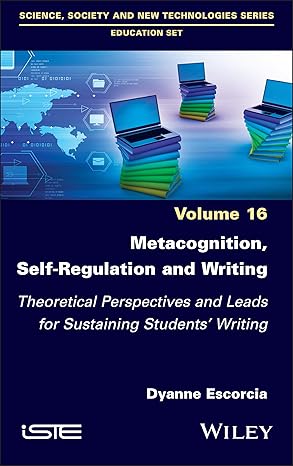
Metacognition, Self-Regulation and Writing: Theoretical Perspectives and Leads for Sustaining Students’ Writing
by: Dyanne Escorcia (Author)
Publisher: Wiley-ISTE
Edition: 1st
Publication Date: 2024/6/26
Language: English
Print Length: 224 pages
ISBN-10: 1786309386
ISBN-13: 9781786309389
Book Description
Students’ difficulties in producing texts that meet the requirements of academic writing are a recurring conce for teaching staff and those responsible for university courses. Various initiatives are currently being taken, mainly at undergraduate level, to help students improve the quality of their writing. Research into metacognitive processes and the self-regulation of leaing can be used to support the design of these writing support systems, particularly by providing a better understanding of the students’ difficulties.This book reviews the concepts of metacognition and self-regulation in relation to writing processes. It analyses the metacognitive components involved in text production, their links with successful writing and their individual and contextual determinants. It completes this analysis by drawing on the teaching and assessment of writing in higher education. All of these elements are articulated around a multifactorial modeling of the leaing and teaching of academic writing.
About the Author
Students’ difficulties in producing texts that meet the requirements of academic writing are a recurring conce for teaching staff and those responsible for university courses. Various initiatives are currently being taken, mainly at undergraduate level, to help students improve the quality of their writing. Research into metacognitive processes and the self-regulation of leaing can be used to support the design of these writing support systems, particularly by providing a better understanding of the students’ difficulties.This book reviews the concepts of metacognition and self-regulation in relation to writing processes. It analyses the metacognitive components involved in text production, their links with successful writing and their individual and contextual determinants. It completes this analysis by drawing on the teaching and assessment of writing in higher education. All of these elements are articulated around a multifactorial modeling of the leaing and teaching of academic writing.
 Wow! eBook
Wow! eBook

